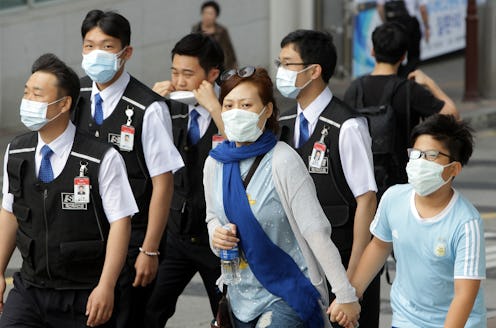News
South Korea's MERS Outbreak Is Getting Worse
Widespread panic continued Wednesday as South Korea's MERS outbreak appeared to worsen. Thirty people have tested positive for the virus, and two people who were confirmed to have the respiratory syndrome have died, according to officials. The World Health Organization on Tuesday said in a statement South Korea could expect more cases as officials scrambled to contain the largest MERS outbreak to ever happen outside the Middle East.
Though multiple countries have seen MERS cases — and deaths — South Korea's outbreak is unprecedented in terms of how the virus has spread. As of Wednesday morning, another 1,369 people remained under quarantine as more than 500 schools closed to help prevent the virus from spreading, officials said.
So far, all reported MERS cases were among medical staff, patients, or visitors at five hospitals. According to WHO, the first South Korean MERS patient, a 68-year-old male, traveled to Bahrain, the United Arab Emirates, Saudi Arabia, and Qatar from April 18 to May 4 before returning to Seoul. On May 11, the man developed symptoms and sought care from two outpatient clinics and two hospitals, WHO said. His MERS diagnosis was confirmed on May 20. The virus likely spread when the man came into contact with hospital staff and other patients.
For South Korea to be the site for the virus outbreak is surprising to some due to the country's advanced health care system. President Park Geun-hye held an emergency meeting with health officials Wednesday to figure out an effective quarantine strategy. Earlier this week, Park blasted health officials' slow response to the outbreak, a criticism among many South Koreans who have resorted to buying masks and hand sanitizer in efforts to stave off infection.
Initial reaction for new infectious diseases like MERS is very important but there were some insufficiency in the initial response including the judgment on its contagiousness.
Because MERS, or Middle East Respiratory Syndrome, is a relatively new disease, researchers know very little except that the virus doesn't spread easily between humans and it has no known cure or vaccine. First reported in 2012, MERS has largely been centered in the Middle East, specifically in Saudi Arabia. Latest figures show there have been 436 deaths out of 1,116 known MERS cases, according to WHO figures, which gives a mortality rate of 39 percent. MERS is in the same coronavirus family as SARS, or Severe Acute Respiratory Syndrome, whose deadly 2003 outbreak in China prompted panic and left hundreds dead in multiple countries. MERS is considered deadlier, but less infectious than SARS.
Images: Getty Images (2)
